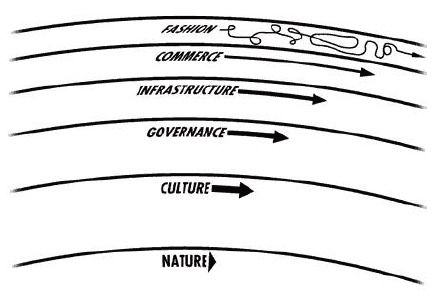In the eighth of a series of Scotregen columns from the International Futures Forum, Andrew Lyon and Dr Pete Seaman offer some new horizons in future regeneration thinking.
All the best for 02011!
At this time of year it is common to think about the future whether through reading your horoscopes for the coming year or reassessing progress and priorities in our personal lives. But how long is your view of the future? Perhaps you think far enough ahead to make plans for your retirement, think about your children’s education or their first house. As professionals, undoubtedly the 2014 Commonwealth Games will be on the radar of someone you know. Perhaps peak oil (which according to some commentators is to happen around 2030) is encouraging you to think about far sighted actions so that we can adapt to a world where oil is scarce.
It has taken a global financial crisis and subsequent threats to our systems of welfare to bring an elongation of the time frames in which we operate. Politicians have begun to talk of responsibility and continuity across generations hastened by deficit and challenges in funding higher education, pensions and how we care for the elderly. Whilst it is glib to suggest a longer term view of the future (or even the present) may have prevented both the financial crash and our current predicament, a shift in time horizons is certainly necessary to help us better prepare for future shocks. What will the communities of the future need and how can we ensure they are best able to prosper, one, two or seven generations hence?
The Long Now Foundation (www.longnow.org) was established to encourage the thinking on longer timescales necessary to ensure our planet is inhabitable for future generations. Stewart Brand proposes civilisation as operating at multiple paces at the same time. Fashion and commerce operate at a fast pace and learn quickly. Nature and culture change slowly but have deep remembering. Infrastructure and governance operate in the wide middle and need to be adept at both rapid learning and deep remembering.

Problems arise when we mix up our timescales and apply the wrong ones to the issue at hand, like using up a geological resource (oil) that has taken millennia to lay down at the pace of commerce or fashion. Our governance structures too, nation states, multi-nationals and global organisations are unused to thinking along the timescales necessary for dealing with these types of problems. For governments there has been a temptation to build systems around the quick returns and votes provided by short term economic prosperity. Intergenerational transfers of assets require a different mindset that seems out of kilter with the pace demanded by modern capitalism.
For today’s regeneration efforts to continue to bear fruit many generations hence they must include elements that lift them out of the rapid pace of commerce and democratic cycles or face future shocks that can set them back generations. One key theme in the history of human civilisations is that they ultimately fail. In a global civilisation the cost of such failure will be greater than ever experienced before.
Expanding our understanding of the future involves elongating our understanding of the past and present also. One way to do this is to think of the current year within the context of a 100,000 year timeframe, so wishing you a prosperous 02011!
